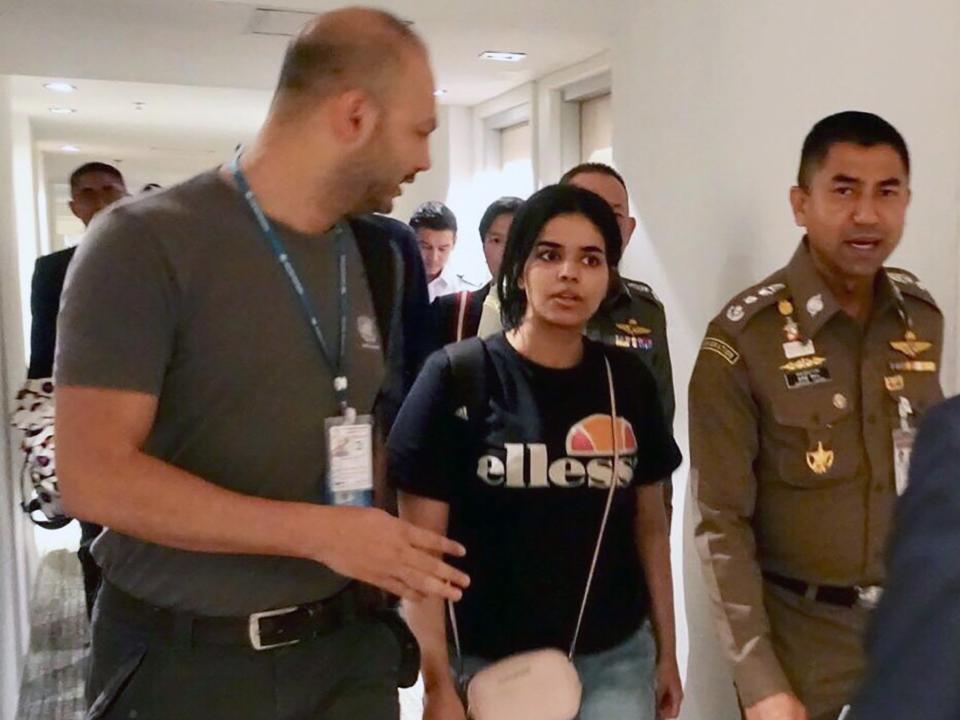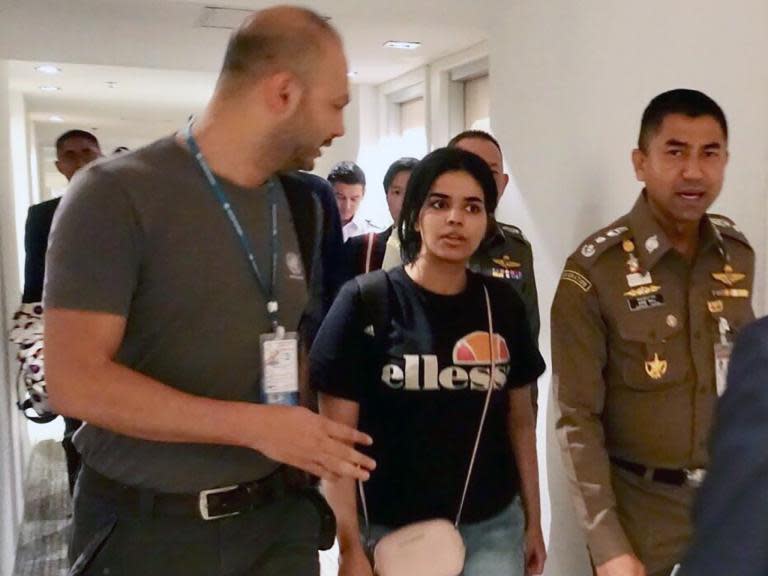Saudi teenager Rahaf offers a blueprint for others – but there will be frustration at the back of the asylum queue
Months on from the murder of journalist Jamal Khashoggi in Istanbul, relations with Saudi Arabia seem to have returned to normal. As gruesome details filtered out relating to his torture and grisly end at the hands of hit men linked to the regime, there was universal condemnation from politicians, much hand-wringing from diplomats and the issuing of weighty statements.
But nothing must interfere with the serious business of trade. The Saudi royal family had a bit of a reshuffle, and now expects the outside world to act like nothing has happened.
However, a Saudi teenage girl who barricaded herself in a hotel room at Bangkok airport last week, and asked the world to help her flee her family back home, could cause relations between the UK, Australia and the Saudis to hit another sticky patch. And her actions could prompt more young women to take the same route, trying to jump the queue for asylum.
Rahaf Mohammed al-Qunun obtained a tourist visa online to visit Australia, because that way her family would remain ignorant of her plans. The 18-year-old had planned her escape for months, aided by friends who had done the same thing. Women in Saudi Arabia are not only constricted in everything they can do by a conservative male-run regime, but they are often forced into arranged marriages by their fathers.
Now, the government has decreed that Saudi women will be notified by text message if they have been divorced, saying it enables them to find out if they are eligible for alimony! The text does not guarantee a woman custody of her children, however.
Rahaf says she had tried to assert her independence, but was kept in her room for six months after she cut her hair and refused to wear a hijab. She also claimed she had been beaten by her brother. In desperation, she bought a ticket to Australia via Thailand online using her credit card, and escaped from the family’s holiday hotel in Kuwait. She managed to get to the international airport undetected.
On arrival in Australia, she had planned to ask for asylum. Her friends, who had already escaped to Sweden and Australia, told her to fly direct, but she took the fatal decision to try and enjoy a minibreak in Bangkok. After touchdown, her passport was taken from her at the airport, and later she was apparently told she would be sent back to her family.
Rahaf then barricaded herself in a hotel room at the airport and took to social media pleading for help. In one day she amassed 45,000 followers on Twitter, to the consternation of Saudi embassy officials, with the #SaveRahaf hashtag gathering momentum by the hour. Her friend Nourah Alharbi offered constant support – she fled Saudi Arabia to Australia and is seeking asylum. One Saudi woman was not so lucky – in 2017 Dina Ali Lasloom was en route to Australia (on a tourist visa) to seek asylum when she was reportedly kidnapped by relatives at the airport in the Philippines and was carried off against her will, screaming and gagged, and forced onto a flight back home. She has not been heard of since.
Rahaf has renounced Islam and says she will be killed if she is returned. The UN refugee agency has declared her a refugee, and Australia is now assessing her case. In the meantime she is under their protection at a safe house. It places the Australian government in a difficult position – if they allow Rahaf to enter the country, she will have jumped the queue. And the scandal of over 1,000 failed asylum-seekers and their families left on Nauru and Manus islands continues – of the children remaining, one family is being denied entry to Australia because the mother is not an asylum seeker, but someone who joined her family.
Asylum seekers from Afghanistan in Australia have been told they face being sent back home, even though they could face certain death.
The Australian government is in a difficult position: although there is considerable sympathy for the plight of Saudi women, critics point out that the country did not offer asylum to other refugees fleeing horrible persecution – the Rohingya for example. As for the UK – how will we react when other Saudi teenagers follow Rahaf’s example and try to visit the UK on holiday, then subsequently claim asylum?
Asylum seekers in both Australia and the UK spend months, and often years, stuck in detention centres while their cases are considered. Paperwork gets lost, decisions procrastinated. During this time asylum seekers cannot work and are separated from their families. There are over 120 women in the Yarl’s Wood Immigration Removal Centre. Last year they staged a hunger strike to protest at their conditions.
Why are these women locked up for an indefinite period, when a 2017 report found that two thirds of the detainees were eventually released and not returned to their homelands?
Will the powerful use of social media by one savvy Saudi teenager change our attitude to asylum seekers fleeing abusive families or regimes? Should Rahaf succeed in her audacious (and heartfelt) campaign, other deserving cases could feel (justifiably) angry.
Love machine
At the world’s biggest fair showcasing new technology in Las Vegas, gadgets for the elderly and infirm are a growing market.
One robot – Bot Care – can monitor sleep patterns, blood pressure and use of medication. Users can chat to it, and the robot will suggest exercise routines.
Feeling lonely? Why not choose a pet robot – called Lovot – which coos when stroked? This potentially annoying gizmo demands affection by waving its arms in the air and devotedly follows its owner around the home. Lovot even “falls asleep” in your arms if given a cuddle. Its inventors claim it’s designed to “nurture people’s capacity to love” – but shouldn’t we be educating the next generation to care for the elderly, not fob them off with an electronic toy?
Monitoring systems are a good idea, but nothing replaces human contact and empathy. My friend visits the home where his elderly mother lives every day and plays the piano to her for half an hour. Then they drink tea together. She has dementia and no longer knows who he is – but don’t tell me she’d look forward to a robot performing the same tasks.


